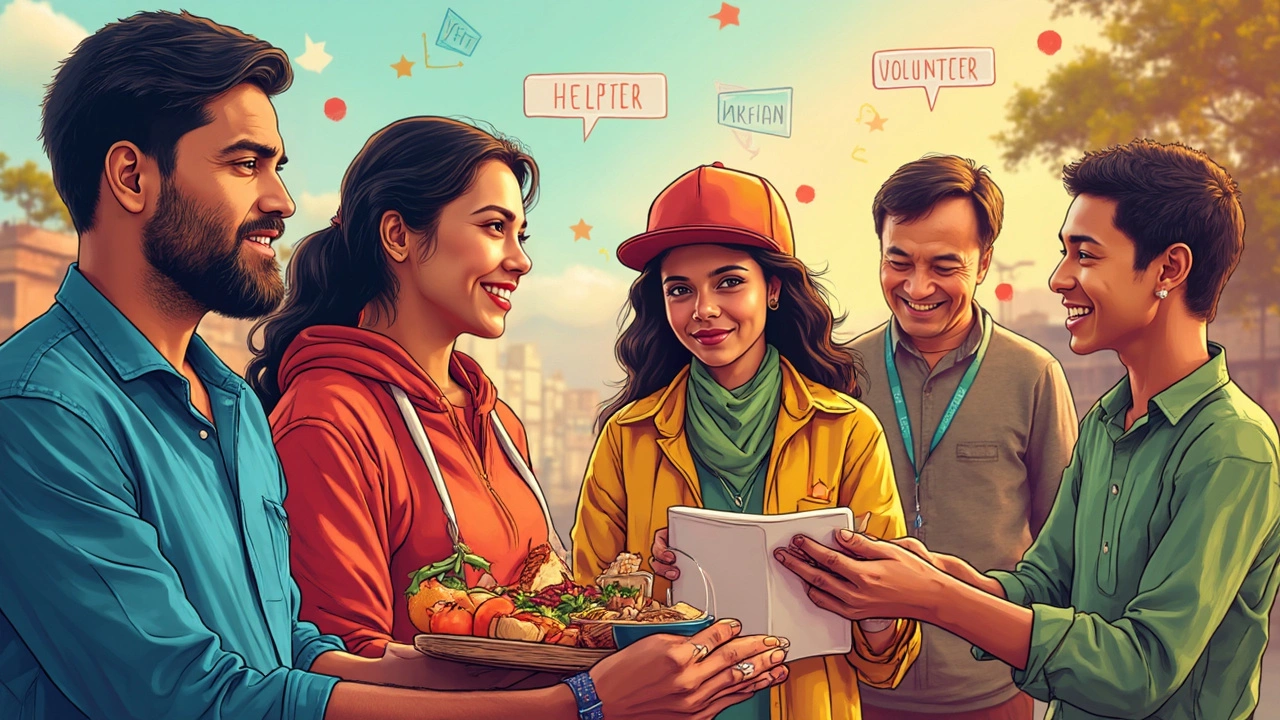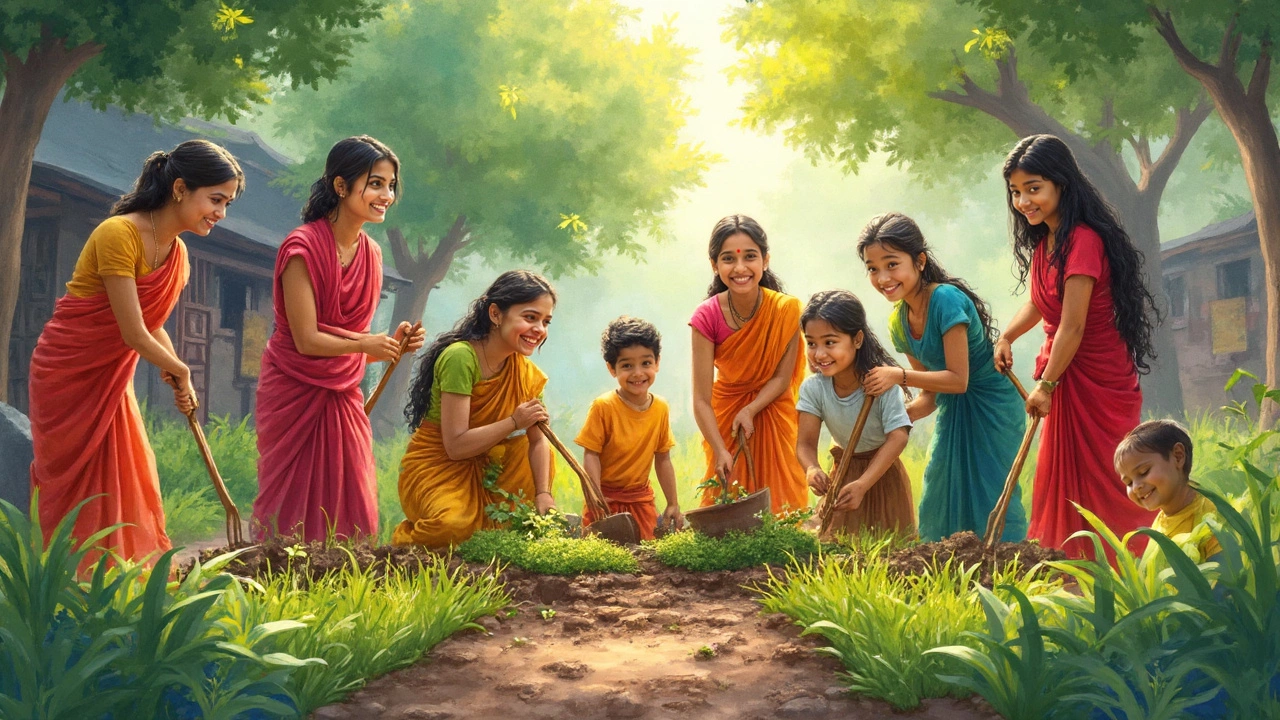Picture someone picking up litter in a park on a Saturday. Or comforting lost pets at the local shelter for hours, unpaid. Or a neighbor knocking on doors to check if the seniors next door need groceries after a storm. Why do these folks show up? What do you even call a person like this? Words like 'volunteer' fit, for sure. But they’re also called helpers, do-gooders, community builders, even heroes, depending on who you ask. And their actions ripple out far beyond what anyone might see at a glance.
The Many Names and Faces of a Volunteer
So, what do you call a person who volunteers? Officially, it’s a 'volunteer'—someone who freely gives their time, skills, or resources to a cause without expecting payment. But the English language loves variety. Depending on context, a volunteer can be called a helper, benefactor, altruist, supporter, or even an activist. There’s no one-size-fits-all label because no two volunteers look exactly the same.
Think about the 'room parent' at your kid’s school—that’s a volunteer. The neighbor tending to the community garden? Also a volunteer. People delivering food for Meals on Wheels or coaching a youth sports team? You guessed it. Even digital do-gooders—folks who build open-source software or mentor online—fit the bill. Census data from 2023 showed nearly 67 million Americans volunteered at least once that year. The most common word used? Still 'volunteer,' but local groups often invent their own nicknames to build unity ('Eco-warrior,' anyone?).
There’s a cool variety by region and role, too. In the UK, you might hear 'carer' or 'befriender' for certain social helpers. In disaster relief, the term shifts again—to 'first responder,' 'emergency worker,' or even 'angel' after severe crises. In places like India, 'sevak' is the traditional word for someone giving service for no reward. Notice how these words don’t just say what the person does—they signal respect or community warmth, too.
Beyond titles, every volunteer shares the core trait of acting by choice. No manager ticking off their hours, and no expectation of payment. If there’s coercion or compulsion, it’s not volunteering—it’s probably just work (or worse). That element of free will is what sets volunteers apart from everyone else. Next time you hear someone refer to 'voluntary hours' or 'service learning,' it comes straight back to that root idea: people helping because they want to, not because they must.
If you’ve never volunteered, maybe the idea feels intimidating. What do you call yourself after your first day sorting cans at the food bank? Simple answer: a volunteer. But even a single hour, given with heart, earns you a spot in this remarkable crowd.
Why Do Volunteers Do It? Understanding Their Motivation
There’s this stereotype that volunteers have a halo over their head, driven only by selfless goodness. But if you peek behind the scenes—and plenty of psychologists have—you’ll see motivations as colorful as a rainbow. Some folks volunteer for connection. They want to build friendships, find belonging, or even reduce loneliness. The Harvard Health newsletter reported in 2021 that adults who volunteer regularly are up to 44% less likely to feel isolated.
Others love the learning aspect. Retirees might tutor kids, not just to help, but to stretch their own minds. Students help at animal shelters to boost their resume or test-drive a future career. Then there are those who volunteer out of gratitude, giving back to a hospital that once cared for them, or a food pantry that helped out when life was rough. Even passions play a huge role—some are suckers for animals, forest trails, or ancient ruins. Their time reflects what matters most to them.
Let’s not forget the ripple of kindness. Volunteers often talk about that hidden, almost addictive joy of seeing their actions spark hope in others. A 2022 study from Johns Hopkins showed repeat volunteers actually reported higher levels of life satisfaction and lower rates of depression. Science speaks: giving helps givers, as much as receivers.
Then, sometimes, a single crisis turns someone into a lifer. Somebody who rushed to sandbag riverbanks during a flood or delivered meals during a pandemic can end up finding purpose they never felt at work. People talk about how showing up once changed their whole world view—what started as a one-off good deed turned into a monthly routine (or a lifelong calling).
If you ever catch yourself thinking, "I wish I had what it takes to be a helper," remember: Volunteers aren’t a separate breed. They’re ordinary folks responding to a nudge. That little voice that says, "I could help there." That’s all it is.

The Many Roles Volunteers Play in Society
So, what do these self-starters actually do? If you can dream it, somebody probably volunteers to do it. Many volunteers are drawn to frontline roles: coaching youth sports, driving seniors to medical appointments, or sorting donations at food banks. Others work behind the scenes—updating spreadsheets for shelters, planning fundraising events, or maintaining community gardens without anyone noticing.
Certain groups are powered almost entirely by volunteers. Think Red Cross disaster response teams or those hospital 'candy stripers' who brighten up a patient’s stay. Volunteer firefighters still make up more than two-thirds of all firefighters in the U.S., answering alarms at odd hours without pay. Libraries everywhere rely on eager readers shelving books or running storytime for toddlers. In the animal world, volunteers care for rescue dogs, maintain bird habitats, or monitor sea turtle nests for months on end.
Some niches are more unique. Prison reading programs rely on volunteers to help inmates develop literacy skills. Legal and medical experts sometimes give 'pro bono' time—that’s just volunteering with a fancy Latin label. Even science gets a boost: amateur 'citizen scientists' team up to count lightning bugs, spot galaxies, or gather weather data. During the pandemic, volunteer groups like Mask Makers cranked out millions of homemade masks for frontline workers. Sometimes 'volunteer' is just another word for 'innovator.'
Faith groups often run on volunteer power, with members organizing meals, shelters, or support lines for people in need. Environmental efforts count on tree-planters, clean-up crews, and community educators—all volunteers pitching in without a paycheck.
Here’s something cool: studies by the Corporation for National and Community Service found that kids whose parents volunteer are much more likely to do it themselves. It’s contagious, in the best sense. Volunteering isn’t just about filling time—it actually shapes who we become, and how we connect to our world.
How Society Benefits When People Volunteer
If every volunteer quit tomorrow, the world would screech to a halt. That’s not an exaggeration. In the U.S., the value of volunteer hours surpassed $190 billion in 2024, according to Independent Sector. That’s more than the annual GDP of several small countries—but most of it never shows up in the headlines. Volunteers are society’s silent muscle, powering services that governments or businesses simply couldn’t replicate.
But the impact goes way beyond dollars. Take disaster relief. When floods, fires, or hurricanes hit, volunteer teams are often the first on the ground. After the Hawaii wildfires in 2023, citizen groups set up donation stations and coordinated evacuees before outside agencies even arrived.
Research out of Stanford University demonstrates that schools with regular volunteer involvement see higher test scores and graduation rates. Hospitals using volunteer 'navigators' for confused patients have lower readmission numbers. Even city streets show the difference—volunteer-run community gardens lower crime and make neighborhoods feel safer, according to studies from the University of Michigan.
Then there’s the empathy boost. When people pitch in side by side, it chips away at barriers like age, income, or faith. Regular volunteering—especially for teens—has been linked to higher empathy, lower risk behaviors, and better mental health. And it’s not just about helping others; volunteers themselves report stronger purpose, new skills, and even lower stress.
If you want to check the pulse of a community, look at volunteer rates. When lots of people sink roots into service, you’ll see tighter-knit neighborhoods, better health outcomes, and a generosity that spills over into daily life. The math is simple: every hour given creates a web of benefits nobody can buy with money.

Tips for Recognizing and Supporting Volunteers Around You
Spotting volunteers is easy when you know what to look for. It’s not usually the ones with the loudest voices or biggest smiles. Instead, pay attention to the quiet helper stacking chairs after an event, the neighbor bringing soup to an ailing friend, or the person picking up trash on their morning walk.
If you know a volunteer—maybe you live with one!—calling out their efforts means a lot. Here are some genuinely useful ways to support and recognize people who give their time freely:
- Say thank you. Simple, but a handwritten note or spoken thanks often means more than an award.
- Help them decompress. Offer a ride, bring a snack, or just listen as they share the ups and downs.
- Public shout-outs. If you manage or work with volunteers, highlight their stories in newsletters or on community boards.
- Respect their boundaries. People give what they can—don’t guilt-trip them into more.
- Support their causes. Even if you’re short on time, sharing info or lending tools helps a ton.
- Give small tokens of appreciation—coffee, gift cards, or just a heartfelt “you made a difference.”
- Nominate them for community awards or recognition events.
If you’re thinking about pitching in yourself, start small. Try a single afternoon at a food pantry, join a community clean-up, or offer to help organize books at the library. There’s no test to pass and no experience required.
Remember, at the volunteer heart of it, giving your time is about seeing others and saying, “I care.” No cape needed. People who give without expecting anything back help stitch society together—one action, one smile, one good deed at a time. That’s what you call a person who volunteers: a builder of hope, one hour at a time.
